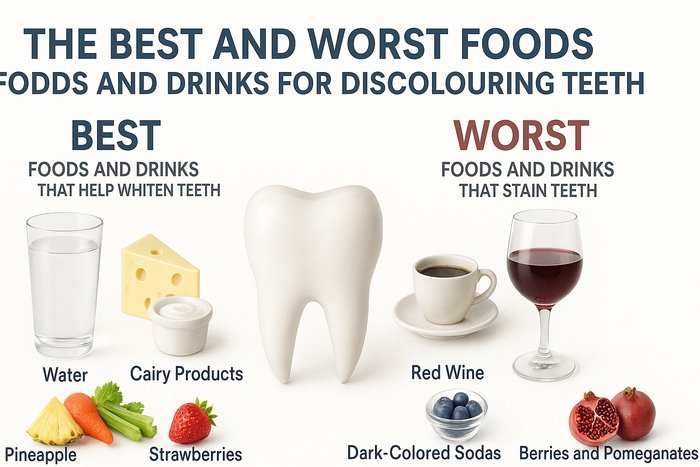The Best and Worst Foods and Drinks for Tooth Discoloration

When it comes to a sparkling white smile, brushing and flossing are only part of the battle. What you eat and drink plays a major role in how your teeth look over time. Some foods and beverages can stain your enamel, while others help keep your mouth clean and your teeth white. Let’s explore the culprits and the protectors of dental brightness.
🚫 The Worst Offenders: Foods and Drinks That Stain Your Teeth
1. Coffee and Tea
Both coffee and tea contain tannins—plant compounds that cause color compounds to stick to your teeth. Black tea in particular is notorious for staining, even more than coffee in some cases.
Pro tip: Add milk to lighten the beverage, and drink through a straw when possible.
2. Red Wine
Red wine contains chromogens (high-pigment molecules) and tannins. Its acidity also weakens enamel, making it easier for stains to set in.
3. Dark-Colored Sodas and Colas
Sugary sodas are doubly damaging: their dark color causes stains, while their acidity erodes enamel. The result? More yellowish teeth over time.
4. Berries and Pomegranates
Healthy as they are, dark-colored fruits like blueberries, blackberries, and pomegranates can leave behind pigment. Juices made from them are even more concentrated.
5. Tomato-Based Sauces
Tomatoes are highly acidic and intensely pigmented—meaning pasta sauce can cling to enamel and dull your smile.
6. Soy Sauce and Balsamic Vinegar
These dark condiments can discolor teeth due to their deep hues and acidity. Sticky textures also mean they linger in the mouth longer.
7. Beets
Whether raw or juiced, beets stain almost anything they touch—including your enamel.
✅ Smile-Friendly Choices: Foods and Drinks That Help Whiten Teeth
1. Water
Water—especially fluoridated water—helps wash away food particles and dilutes acids that cause erosion. It also helps prevent dry mouth, which can increase the risk of staining.
2. Dairy Products
Milk, cheese, and yogurt are rich in calcium and phosphates, which can help strengthen tooth enamel. Cheese also encourages saliva production, helping to rinse away food particles.
3. Crunchy Fruits and Vegetables
Apples, carrots, celery, and cucumbers act like natural toothbrushes. Their fibrous texture scrubs teeth as you chew, helping to remove surface stains.
4. Pineapple
Pineapple contains bromelain, an enzyme that may help remove tooth stains and plaque.
5. Strawberries
Ironically, while darker berries can stain teeth, strawberries contain malic acid—a natural astringent that can help remove surface discoloration.
🦷 Smart Habits to Prevent Discoloration
-
Rinse after consuming stain-prone foods or drinks: Swishing with water can help reduce staining.
-
Use a straw: This minimizes contact between your teeth and dark liquids.
-
Don’t brush immediately: After acidic foods, wait at least 30 minutes to brush to avoid damaging softened enamel.
-
Maintain regular cleanings: Professional dental cleanings remove stains and polish your enamel.
Final Thoughts
While some tooth discoloration is natural over time, your diet has a profound impact. Avoiding or minimizing the worst offenders and embracing teeth-friendly foods can go a long way in preserving a bright, healthy smile. Pair these choices with good oral hygiene, and you’ll be grinning confidently for years to come.



